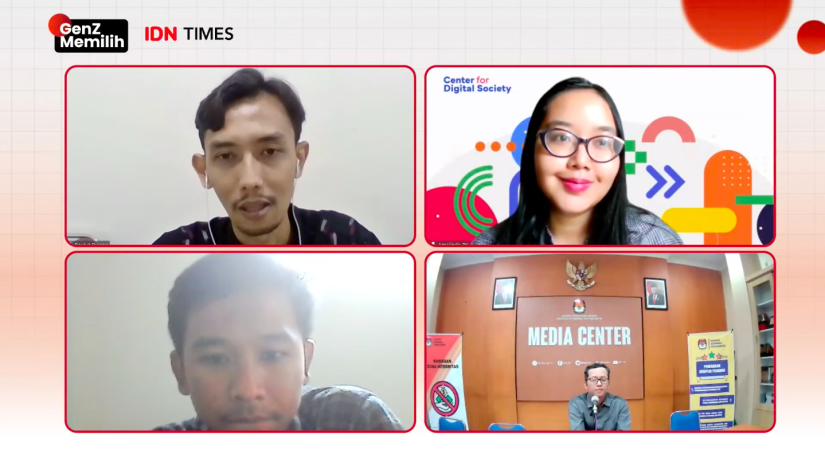
Yogyakarta, April 12th 2023—The Center for Digital Society (CfDS) Fisipol UGM collaborated with IDN times in Digitalk X GenZ in holding the GenZ Votes on Wednesday (12/4). The event was held online, with the theme of “The Effect of Social Media Towards Gen Z’s Choice in the 2024 Election”. The theme was chosen based on the fact that youths are now going to participate in Indonesia’s 2024 election, in the middle of hoax, disinformation, and misinformation. In response to that, it is important for policymakers to mitigate the risk, especially in social media.
This event invited Hamdan Kurniawan as the Leader of KPU DI Yogyakarta, Gielbran M. Noor as the Head of UGM Student Council, and Amalinda Pandu as CfDS UGM researcher. The moderator was Paulus Risang, the editor of IDN Times Jogja.
Hamdan opened the discussion session by talking about how the Central Election Committee (KPU) uses technology through an existing website, for example, SIPOL that is used to register and verify political parties and prospective voters.
The discussion also highlights the party caderization revamp where the focus is now shifted towards the values of the politicians instead of materialistic aspects to increase the trust from the public. “The focus of the politician is directed towards problems in their regions because every region has its own issue. This can be solved by the politicians that will participate in the election,” said Gielbran.
Not only political parties or prospective politicians, the public should also be more politically literate. Political literacy can be defined as the ability of voters to withstand intimidation and unhealthy transactional persuasion. Political literacy education should also start to be implemented through social media instead of conventional systems.
Political literacy will create young voters who understand their role, which is to be a watchdog of the election process by actively educating others about hoax, disinformation, and misinformation. Active participation seen through reporting dangerous content and preventing its spread also counts.
Young voters also need to analyze the social media accounts of the committee and participants of a campaign, campaign advertisements, and dangerous content that tries to spread hatred.
“As young voters, we need to build a digital culture, which includes the ability to read and to internalize nationalism, Pancasila, and Bhineka Tunggal Ika in our everyday life,” said Amelinda to close the discussion.
